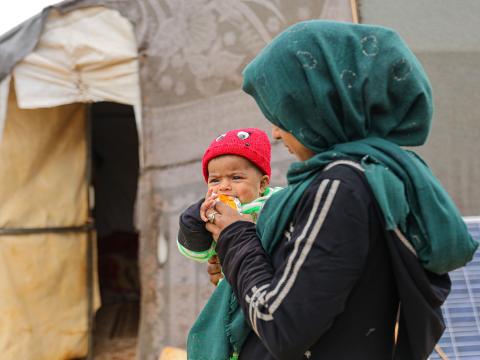Syrians are "forgotten, underfunded” and "gripped by food security, nutrition & climate change crises", ahead of major international conference – World Vision

(Amman – 26 April 2024) The world has "turned its back on Syrians", despite them being gripped by numerous crises, such as hunger, malnutrition, climate change and a protracted conflict says international aid and development charity, World Vision, who has been working in the response to the Syrian crisis since 2014. World Vision is sounding the alarm that the humanitarian crisis will only get worse unless immediate action is taken, ahead of the European Union’s Brussels VIII conference on supporting the future of Syria and the region which begins on April 30th.
A new policy brief by World Vision, entitled SPOTLIGHT ON NUTRITION, FOOD SECURITY & CLIMATE CHANGE IN SYRIA & HOST COUNTRIES, highlights how in Syria:
- Over 12.9 million Syrians are struggling with inadequate food supplies, while another 2.6 million are on the brink of food insecurity according to World Food Programme (WFP)
- Female-headed households are facing high levels of food insecurity that are exposing them to increased risks of gender-based violence, exploitation and abuse
In Lebanon, which hosts 1.4 million Syrian refugees:
- There is a multifaceted socio-economic crisis that is devastating education and food security specifically
- According to World Vision’s research, Food insecurity and malnutrition during emergencies can have significant economic consequences, increasing healthcare and social costs, while also causing loss of productivity and educational attainment
- 277,000 children under the age of 5 are experiencing food poverty in Lebanon, with 85,000 living in severe food poverty, according to UNICEF’s 2023 Child Food Poverty Report
In Türkiye, which hosts 3.2 million Syrian refugees:
- More than 85% of Syrian families reported a decline in their financial situation since inflation soared to 61.5% in 2023
- Only 18% of Turkish citizens reported being able to fully cover their expenses, highlighting significant financial challenges among both communities
In Jordan, where 1.3 million Syrian refugees reside:
- A vast majority of Syrian households (93%) are taking on debt as they struggle to meet basic needs
- 18% of Syrian households are facing severe food insecurity in 2023, and 27% reporting challenges in affording food
- Recent 3RP data from both host communities and refugee camps in Jordan highlight an increase in child protection concerns for Syrian refugee children due to continuing financial hardships, with a doubling of school withdrawals, a five-fold increase in child labour and a tripling of early marriages
A number of countries in the region that are affected by the Syria crisis are also deeply impacted by the effects of climate change:
- Jordan is one of the most water-scarce countries in the world making it particularly vulnerable to climate change. The country is expected to experience more heatwaves as temperatures are predicted to rise by 4.5°C within the next 50 years, while water availability will likely decline by 75%, negatively impacting agricultural outputs.
- Climate change is also the biggest threat to Iraq’s long-term food security due to its soaring temperatures, diminishing rainfall, droughts and water scarcity, in addition to its frequent sand and dust storms. A 2023 research led by World Vision revealed that the educational pursuits of children are often hindered by climate change, as floods and droughts disrupt school attendance, and compromise children and young people’s access to nutritional diversity.
Eleanor Monbiot, Regional Leader at World Vision Middle East and Eastern Europe, says:
"This is a troubled world, with new humanitarian crises appearing before protracted ones are resolved. However, this is not an excuse for the international community to deprioritise Syrians and host communities, who are continuing to endure a generation of growing needs, as a result of over 13 years of conflict.
"As the humanitarian aid community prepares to go to the Brussels VIII Conference, we are asking the world to re-commit to solving the myriad of crises that embrace Syrians inside and outside of the country.
"War, hunger, malnutrition, climate change – the complexity of the Syrian crisis is evolving the longer it goes on and, tragically, there is no end in sight. Syrians are being forgotten and underfunded, despite the reality that they desperately need more money and more attention.
"We must solve all humanitarian crises, not some. Many Syrians and host communities feel like the world has turned its back on them – this conference is a chance for governments to show – not just action – but compassion."
ENDS
NOTES TO EDITOR
In September 2023, World Vision announced that it would commit US$3.4bn as part of its new global campaign called ‘ENOUGH’ that aims to end child hunger and malnutrition. This includes investing the funds over three years into work that will reduce hunger and improve the nutritional status of 125 million children in 67 countries where they are suffering most. The ENOUGH campaign is World Vision’s latest contribution to sounding the alarm about the hunger global emergency.
For interview requests, please contact Evita Jourdi: evita_jourdi@wvi.org